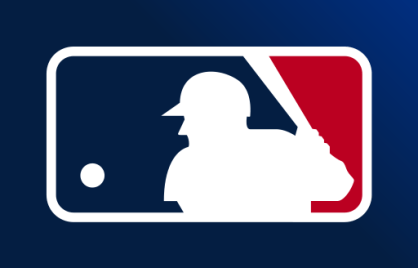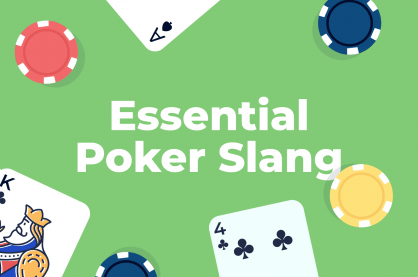Blackjack Strategy: Should You Hit on a 15?
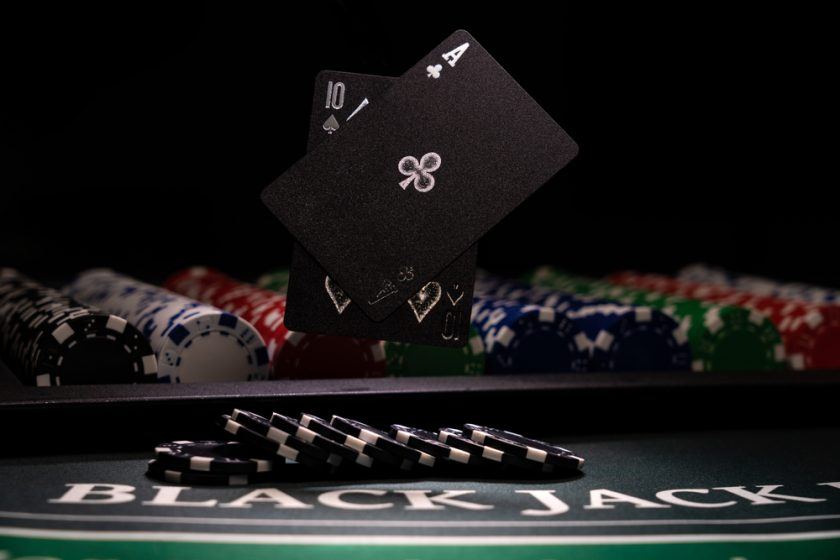
Should You Hit on a 15: What You Need to Know
- Understanding the Situation: A hand of fifteen in blackjack is often regarded as a tricky situation. It’s not a strong hand, but it’s also not low enough to hit without significant risk.
- Evaluating Dealer’s Upcard: If the dealer’s upcard is a 2,3 or 7 and above, it’s recommended that you hit. A dealer’s 2 or 3 are not as weak as they seem, and anything from 7 upwards increases the likelihood that they’ll have a strong hand.
- Dealer’s Weak Upcards: If the dealer is showing a ‘weak’ card (4, 5, or 6), your best strategy is typically to stand. They’re likely to go over 21, giving you a higher chance of winning.
- Playing with a Strategy: Using a basic strategy chart for blackjack can help guide your decision-making process, especially during complex hand situations like holding a fifteen.
- No Perfect Answer: With a total hand of fifteen, there’s no 100% correct strategy and outcomes can be unpredictable. Blackjack is a game of chance, so it’s important to understand risk and make informed decisions.
Should You Hit on a 15 is one of trickier question to answer in Blackjack. If your goal is to learn how to play optimal Blackjack, whether online or in a casino, you need to be ready to take the correct action in every situation, no matter what your hand is.
While it’s fun to focus on what to do when you have an advantageous hand, it’s just as important to know whether to hit or stand when the odds are stacked against you.
If you have any Blackjack gameplay experience, you know that getting dealt a 15 is just such a situation. While your outlook is grim with such a weak hand it’s important to know the right and wrong way to play.
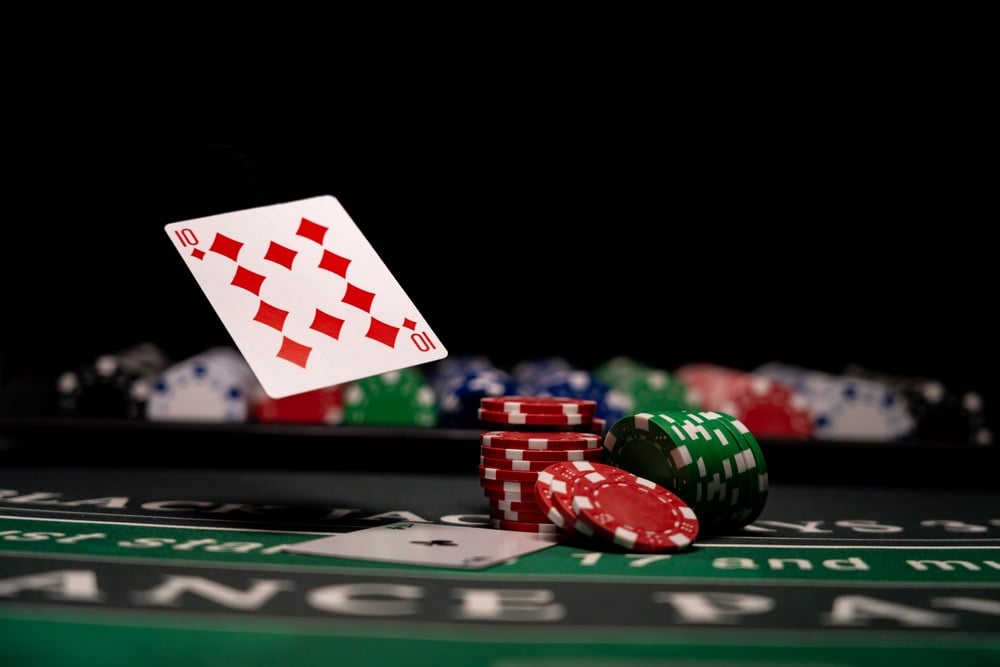
Image credit: Netfalls Remy Musser/Shutterstock
A Blackjack Hand of 15
Because of the way Blackjack card values are assigned, you’ll see an outsized population of 10-cards (Ten, Jack, Queen, King), whether you’re playing a single-deck or multi-deck game.
In addition to the surplus of 10-cards, a Blackjack deck includes a card with a split personality – the Ace. Aces can count as either 1 or 11, whichever is most advantageous.
To put it simply, think of your Ace as an 11 unless that causes your hand to go over 21 and bust. If so, consider your Ace to be a simple 1.
In Blackjack, a hand of 15 can be produced on the deal in any one of four possible two-card combinations:
- Eight and Seven
- Nine and Six
- 10-card and Five
- Ace and Four
The probability of being dealt a 15 with the first two cards of a Blackjack game is around 8.4%. That translates to once out of every 12 hands or so, you’ll get a 15 and have to make the best of a bad situation.
Aside Those four combinations aren’t the only way to get to a 15 in Blackjack. It’s also possible to hit your way to 15 starting from a hand with a different value. For example, you’re dealt Six-Deuce for a hand value of 8. With no risk, you hit and are dealt a Seven. Six-Deuce-Seven makes 15. Whether it took you three cards to get there instead of two, the gameplay strategy is mostly the same.
Should You Hit on 15: Reading and Reacting to the Dealer’s Up-Card
Correct play on a hand of 15 in Blackjack means coming to a fork in the road, reading the signs, and making a turn in the right direction. What are the signs you need to read? Simply put, the way you proceed depends on the Dealer’s up-card.
Aside: Remember at the end of an initial Blackjack deal, every player at the table will have two cards along with the Dealer. But only one of the Dealer’s cards – the up-card – will be visible to you. The Dealer’s face-down card or hole card is only revealed after everyone at the table has played out their hand.
The card shown by the Dealer can be thought of in two general categories: bust cards and superior cards:
- Bust cards (Deuce, Three, Four, Five, or Six) put the Dealer in a position to go over 21 and bust. You can expect to see a Dealer bust card about 38% of the time.
- Superior cards (Seven, Eight, Nine, 10-card, or Ace) show up 62% of the time. These cards mean the Dealer is likely to have a made hand, or a hand of 17 or more.
While you’re hoping the Dealer shows a bust card, just understand that 15 is the weakest hand in Blackjack. In the long run, even if you’re making perfect decisions, you’ll only win about a quarter of these hands.
Even though you’ll lose more than you’ll win, it’s important to play the following strategy out in order to make the most of a bad situation and keep the casino’s house edge to a minimum.
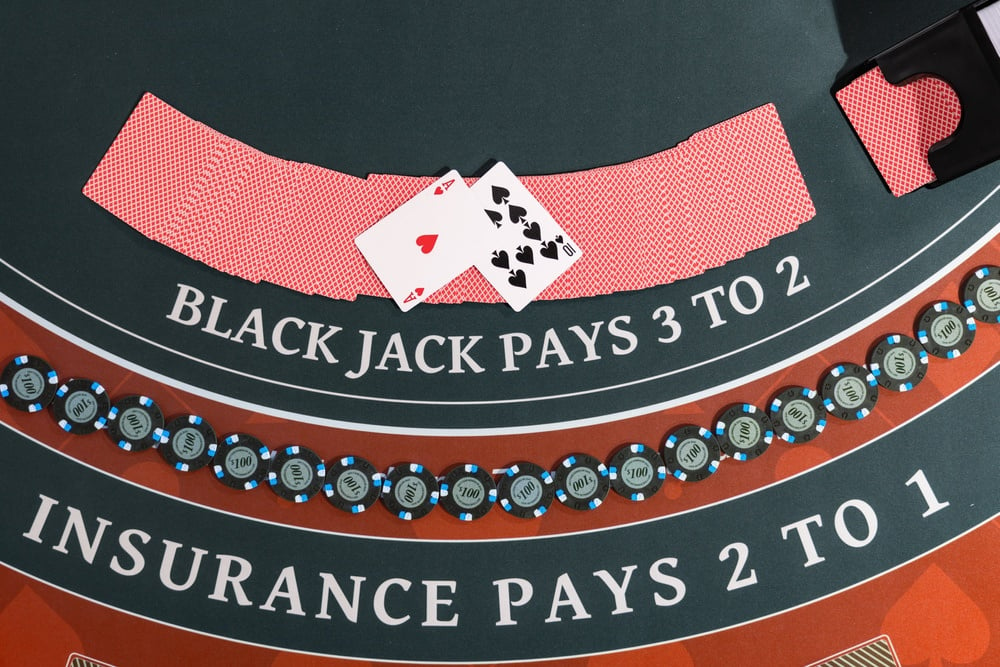
Image credit: Netfalls Remy Musser/Shutterstock
Standing on 15 Versus a Bust Card
If the Dealer shows a bust card (Deuce, Three, Four, Five, or Six), your play is to stand. Drawing one of the many 10-cards (Ten, Jack, Queen or King) as well as Seven, Eight, or Nine would send you North of 21 and into bust territory.
Drawing an Ace wouldn’t help you as your hand would become an equally weak 16. Only a precious few cards could help you here, but since 15 won’t beat any Dealer hand, why not hit and try to improve?
The answer is that the Dealer is also in a precarious situation. Should the Dealer have a 10-card in the hole, then draw a 10-card, that’s a bust, and your lowly 15 would win.
When you weigh the comparative probabilities, you’re better off holding on to your 15, avoiding the risk of taking a hit, and hoping the Dealer busts.
Hitting on 15 Versus a Superior Card
If the Dealer shows a superior up-card card (a 7, 8, 9, 10, or Ace) against your 15, you must hit. Yes, it’s a high-risk move; more than half the time you will draw a card that’s too big and bust.
However, we always assume the Dealer is hiding a 10-card, and if so, the Dealer has a made hand of 17 through 21, any of which will beat your 15 should you stay.
While you’re a serious underdog, your best chance with a 15 against a superior up-card is to take the risk and try to improve your hand. Cross your fingers, rub your lucky rabbit’s foot, and take a hit.
- If you draw an Ace, your crummy 15 has now become a lousy 16. You didn’t bust, but you have to take another hit for the same reason as above; the Dealer likely has a made hand, so you have no choice but to try and improve yours.
- If you draw a Deuce, Three, Four, Five, or Six, congratulations. You may not win the hand, but at least you didn’t bust! Either way, now you can simply stand; your hand is as good as it’s likely to get.
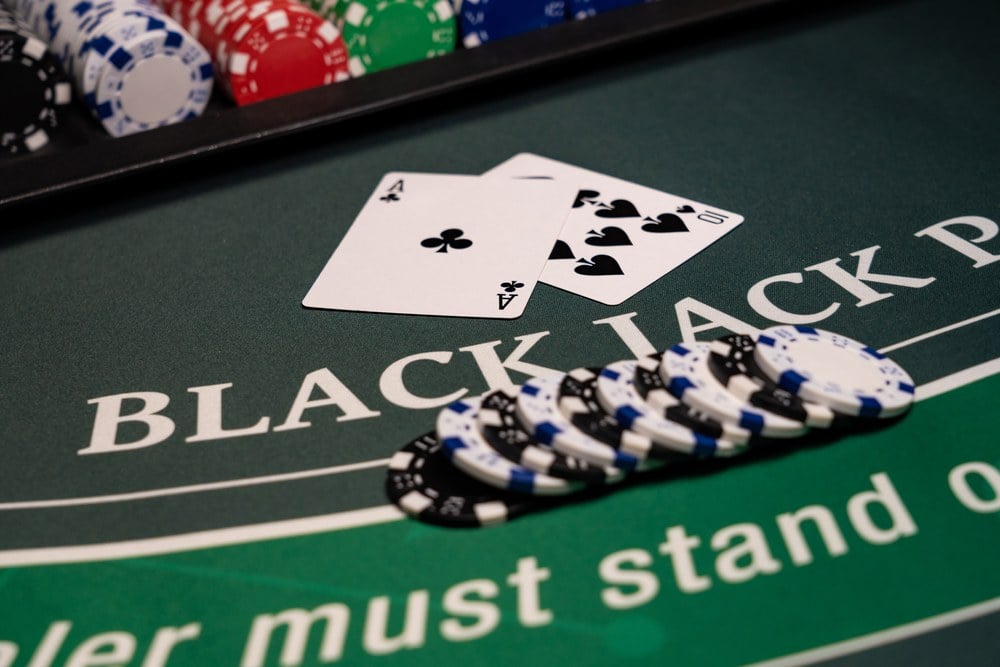
Image credit: Netfalls Remy Musser/Shutterstock
Should You Hit on 15: What to do With a Soft 15
The situations above applied to all combinations of cards making 15 except where you’ve drawn an Ace that’s counting as 11.
For example, if you are dealt Ace-Four, you have a Soft 15 and can take a hit with no risk of busting. In the event you are dealt a Seven or higher, your Ace can simply transition and become a 1.
Just remember: 15 is such a disadvantageous hand that – unless the Dealer is likely to bust – you have no choice but to take a risk and try and improve its value. And since you can attempt upgrading your Soft 15 completely risk-free, taking a hit here is the obvious play.
If you’re lucky, you’ll draw a card that’s big enough to improve the value of your hand without pushing you over 21. And if you draw a large card, you can value the Ace in your hand as a 1 rather than 11.
Should You Hit on 15: Advanced Strategies
Casino house rules differ on when it’s ok for the Player to double down, that is double your initial bet and receive a single additional card. In more lenient games, you can double on any two initial cards, but some games restrict you to only doubling down on specific hand values (like 9, 10, or 11).
If it’s allowed, aggressive players will double down on Soft 15 versus the two worst Dealer up-cards (Five or Six). That may seem counterintuitive since 15 is such a weak hand and so few cards improve its value.
But with a Five or Six, the Dealer has a 41-42% chance of busting. That probability, combined with the chance (albeit low) of improving your hand and beating the Dealer in a showdown, make doubling down the right play here.
Aside: if you’re not feeling particularly aggressive, or you’re trying to preserve your chip stack, there’s nothing wrong with simply hitting with your Soft 15 against a Dealer Five or Six.
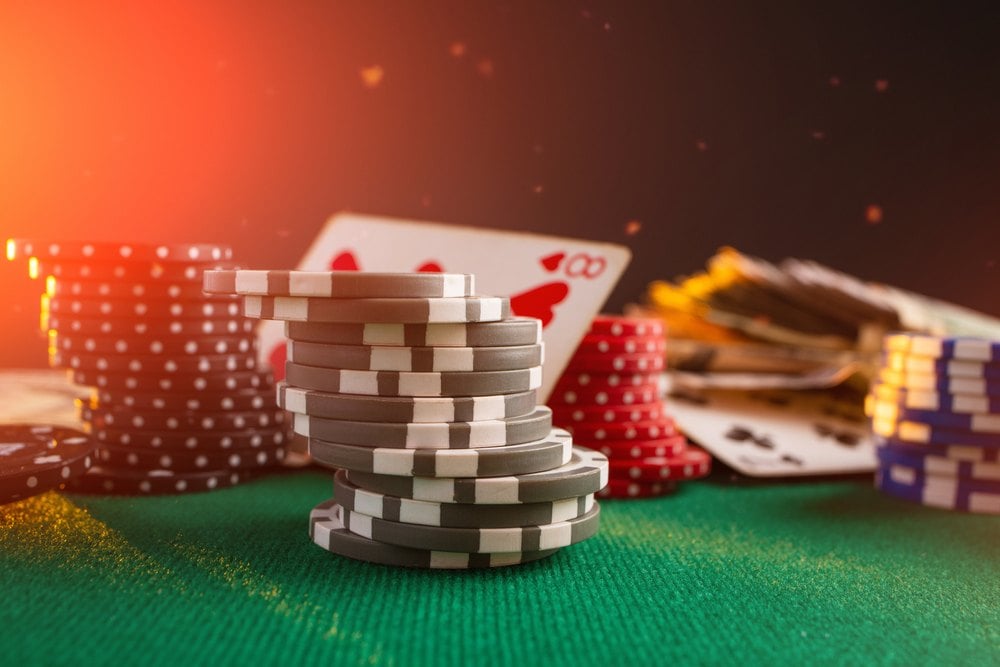
Image credit: Anton27/Shutterstock
Should You Hit on 15: Summarizing the Strategy
Here’s a simple chart you can reference that summarizes the strategies we’ve discussed:
| Player’s Hand | Dealer Up-Card | Action |
| Hard 15 (on two or more cards) | Seven, Eight, Nine, 10-card, or Ace | Hit (and Pray!) |
| Hand Value Resulting from Hit: 16 | Hit Again (and Pray Harder!) | |
| Hand Value Resulting from Hit: 17-21 | Stand | |
| Deuce, Three, Four, Five, or Six | Stand | |
| Soft 15 (on two cards) | Five or Six | Double Down |
| All others | Hit |
Other Advanced Considerations
Blackjack gameplay and rules vary from casino to casino and from table to table. You might find games with a single-deck or from multiple decks. Dealer and Player rules can also vary widely. Wherever possible, the one rule you should seek out in any Blackjack game is one where a Natural 21 (Ace and 10-card) pays a full 3-to-2 on your bet.
Some casinos only pay 6-to-5 these days, which will cut deeply into your winnings.
But as long as you’re playing a standard game of Blackjack with normal (and narrow) rules variations, your strategy on 15 stays the same. That includes games that allow Late Surrender.
Keep the above chart in mind and you’ll do fine, even with one of the weakest hands in the game.
Mastering the 15 Play in Blackjack
With this strategy in your back pocket, along with our other articles on how to play some of the trickiest Blackjack hands, you have a fighting chance to play the game optimally and minimize the house advantage.
If you’re still feeling a little unsure of yourself, try your hand at a free Blackjack game; many online casinos offer games purely for fun and practice. Once you’re confident in your ability to make good choices, you can graduate to a real-money blackjack game, whether online or in a casino.
Title Image credit: Netfalls Remy Musser/Shutterstock

